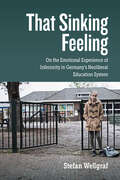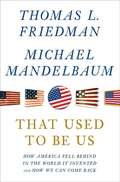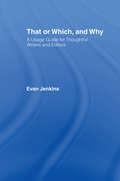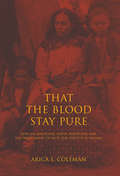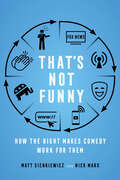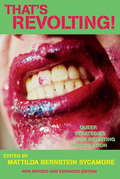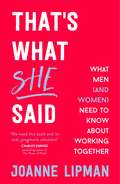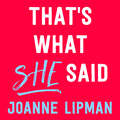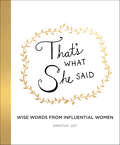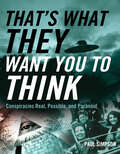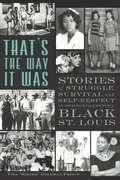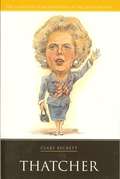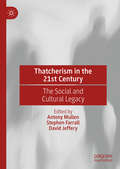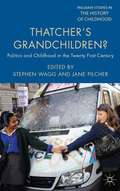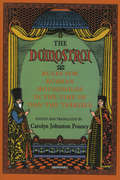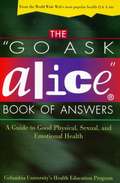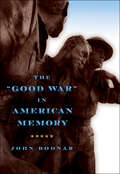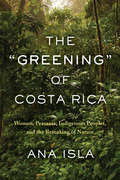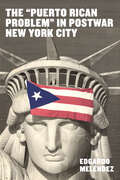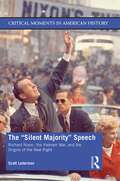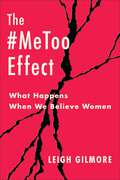- Table View
- List View
That Sinking Feeling: On the Emotional Experience of Inferiority in Germany's Neoliberal Education System
by Stefan WellgrafEmotions, especially those of impoverished migrant families, have long been underrepresented in German social and cultural studies. That Sinking Feeling raises the visibility of the emotional dimensions of exclusion processes and locates students in current social transformations. Drawing from a year of ethnographic fieldwork with grade ten students, Stefan Wellgraf’s study on an array of both classic emotions and affectively charged phenomena reveals a culture of devaluation and self-assertion of the youthful, post-migrant urban underclass in neoliberal times.
That Used to Be Us: How America Fell Behind in the World It Invented and How We Can Come Back
by Thomas L. Friedman Michael MandelbaumAmerica is in trouble. We face four major challenges on which our future depends, and we are failing to meet them -- and if we delay any longer, soon it will be too late for us to pass along the American dream to future generations. In That Used to Be Us, Thomas L. Friedman, one of our most influential columnists, and Michael Mandelbaum, one of our leading foreign policy thinkers, offer both a wake-up call and a call to collective action. They analyze the four challenges we face -- globalization, the revolution in information technology, the nation's chronic deficits, and our pattern of excessive energy consumption -- and spell out what we need to do now to sustain the American dream and preserve American power in the world. They explain how the end of the Cold War blinded the nation to the need to address these issues seriously, and how China's educational successes, industrial might, and technological prowess remind us of the ways in which "that used to be us. " They explain how the paralysis of our political system and the erosion of key American values have made it impossible for us to carry out the policies the country urgently needs. And yet Friedman and Mandelbaum believe that the recovery of American greatness is within reach. They show how America's history, when properly understood, offers a five-part formula for prosperity that will enable us to cope successfully with the challenges we face. They offer vivid profiles of individuals who have not lost sight of the American habits of bold thought and dramatic action. They propose a clear way out of the trap into which the country has fallen, a way that includes the rediscovery of some of our most vital traditions and the creation of a new thirdparty movement to galvanize the country. That Used to Be Us is both a searching exploration of the American condition today and a rousing manifesto for American renewal.
That or Which, and Why: A Usage Guide for Thoughtful Writers and Editors
by Evan JenkinsThat or Which, and Why is an insightful and witty guide to writing. Based on Evan Jenkins's long-running column 'Language Corner' in Columbia Journalism Review, the book is compiled of brief, alphabetically arranged entries on approximately 200 major writing stumbling blocks, from the wonderful world of 'that' and 'which' to trickier terrain like the correct usage of common idiomatic expressions.Working from his experiences as a newsroom editor and teacher, Jenkins' humorous tone puts the reader at ease, unlike many of the writing and usage guides out there that are off-putting in their rigidity and dogmatism. He takes the 'we're-all-in-this-together' approach to teaching better writing - maintaining a light tone throughout the book and emphasizing flexibility and easy-to-use guidelines rather than delivering orders from Grammar-on-high.
That the Blood Stay Pure
by Arica L. ColemanThat the Blood Stay Pure traces the history and legacy of the commonwealth of Virginia's effort to maintain racial purity and its impact on the relations between African Americans and Native Americans. Arica L. Coleman tells the story of Virginia's racial purity campaign from the perspective of those who were disavowed or expelled from tribal communities due to their affiliation with people of African descent or because their physical attributes linked them to those of African ancestry. Coleman also explores the social consequences of the racial purity ethos for tribal communities that have refused to define Indian identity based on a denial of blackness. This rich interdisciplinary history, which includes contemporary case studies, addresses a neglected aspect of America's long struggle with race and identity.
That's Not English
by Lynne Truss Erin MooreAn expat's witty and insightful exploration of English and American cultural differences through the lens of language that will leave readers gobsmackedIn That's Not English, the seemingly superficial differences between British and American English open the door to a deeper exploration of a historic and fascinating cultural divide. In each of the thirty chapters, Erin Moore explains a different word we use that says more about us than we think. For example, "Quite" exposes the tension between English reserve and American enthusiasm; in "Moreish," she addresses our snacking habits. In "Partner," she examines marriage equality; in "Pull," the theme is dating and sex; "Cheers" is about drinking; and "Knackered" covers how we raise our kids. The result is a cultural history in miniature and an expatriate's survival guide. American by birth, Moore is a former book editor who specialized in spotting British books--including Eats, Shoots & Leaves--for the US market. She's spent the last seven years living in England with her Anglo American husband and a small daughter with an English accent. That's Not English is the perfect companion for modern Anglophiles and the ten million British and American travelers who visit one another's countries each year.
That's Not English: Britishisms, Americanisms, and What Our English Says About Us
by Lynne Truss Erin MooreAn expat's witty and insightful exploration of English and American cultural differences through the lens of language that will leave readers gobsmackedIn That's Not English, the seemingly superficial differences between British and American English open the door to a deeper exploration of a historic and fascinating cultural divide. In each of the thirty chapters, Erin Moore explains a different word we use that says more about us than we think. For example, "Quite" exposes the tension between English reserve and American enthusiasm; in "Moreish," she addresses our snacking habits. In "Partner," she examines marriage equality; in "Pull," the theme is dating and sex; "Cheers" is about drinking; and "Knackered" covers how we raise our kids. The result is a cultural history in miniature and an expatriate's survival guide. American by birth, Moore is a former book editor who specialized in spotting British books--including Eats, Shoots & Leaves--for the US market. She's spent the last seven years living in England with her Anglo American husband and a small daughter with an English accent. That's Not English is the perfect companion for modern Anglophiles and the ten million British and American travelers who visit one another's countries each year.
That's Not Funny: How the Right Makes Comedy Work for Them
by Matt SienkiewiczA rousing call for liberals and progressives to pay attention to the emergence of right-wing comedy and the political power of humor. "Why do conservatives hate comedy? Why is there no right-wing Jon Stewart?" These sorts of questions launch a million tweets, a thousand op-eds, and more than a few scholarly analyses. That's Not Funny argues that it is both an intellectual and politically strategic mistake to assume that comedy has a liberal bias. Matt Sienkiewicz and Nick Marx take readers––particularly self-described liberals––on a tour of contemporary conservative comedy and the "right-wing comedy complex." In That's Not Funny, "complex" takes on an important double meaning. On the one hand, liberals have developed a social-psychological complex—it feels difficult, even dangerous, to acknowledge that their political opposition can produce comedy. At the same time, the right has been slowly building up a comedy-industrial complex, utilizing the humorous, irony-laden media strategies of liberals such as Jon Stewart, Samantha Bee, and John Oliver to garner audiences and supporters. Right-wing comedy has been hiding in plain sight, finding its way into mainstream conservative media through figures ranging from Fox News's Greg Gutfeld to libertarian podcasters like Joe Rogan. That's Not Funny taps interviews with conservative comedians and observations of them in action to guide readers through media history, text, and technique. You will find many of these comedians utterly appalling, some surprisingly funny, and others just plain weird. They are all, however, culturally and politically relevant—the American right is attempting to seize spaces of comedy and irony previously held firmly by the left. You might not like this brand of humor, but you can't ignore it.
That's Revolting!: Queer Strategies for Resisting Assimilation
by Bernstein Sycamore MattildaAs the gay mainstream prioritizes the attainment of straight privilege over all else, it drains queer identity of any meaning, relevance, or cultural value, writes Matt Bernstein Sycamore, aka Mattilda, editor of That's Revolting! . This timely collection shows what the new queer resistance looks like. Intended as a fistful of rocks to throw at the glass house of Gaylandia, the book challenges the commercialized, commodified, and hyperobjectified view of gay/queer identity projected by the mainstream (straight and gay) media by exploring queer struggles to transform gender, revolutionize sexuality, and build community/family outside of traditional models. Essays include "Dr. Laura, Sit on My Face,” "Gay Art Guerrillas,” "Legalized Sodomy Is Political Foreplay,” and "Queer Parents: An Oxymoron or Just Plain Moronic?”
That's What She Said: What Men Need to Know (and Women Need to Tell Them) About Working Together
by Joanne LipmanA FINANCIAL TIMES BUSINESS BOOK OF THE MONTH'Urgently needed' Charles Duhigg, bestselling author of THE POWER OF HABIT and SMARTER'Attention, good guys: this book is for you' Adam Grant, bestselling author of ORIGINALS and OPTION B with Sheryl Sandberg 'I know what you're thinking: 'Not another career guide-cum-manifesto, telling us to "woman up" and demand more money.' But that isn't what Lipman says. Instead, she uses data, reams of it, to expose how the system is rigged against women. She then calls for men to join the fight to make the workplace more equal' SUNDAY TIMES STYLE MAGAZINEWomen spend their working lives adapting to an environment set up for men, by men: from altering the way they speak to changing the clothes they wear to power posing. But still the gender gap persists. And once you see it - women being overlooked, interrupted, their ideas credited to men - it's impossible to ignore. But it needn't be this way.Diving deep into the wide range of government initiatives, corporate experiments and social science research Joanne Lipman offers fascinating new revelations about the way men and women work culled from the Enron scandal, from brain research, from transgender scientists and from Iceland's campaign to 'feminise' an entire nation. Packed with fascinating and entertaining examples - from the woman behind the success of Tupperware to how Google reinvented its hiring process - That's What She Said is a rallying cry to both men and women to finally take real steps towards closing the gender gap.Previously published as WIN WIN: When Business Works for Women, It Works for Everyone
That's What She Said: What Men Need to Know (and Women Need to Tell Them) About Working Together
by Joanne LipmanLEAN IN meets FREAKONOMICS. How men and women can close the gender gap in the workplace.We all agree that men and women think and behave differently. Here, at last, is a book that shows both sides what to do about it.When Joanne Lipman wrote the article 'Women at Work: A Guide for Men' for Wall Street Journal, it immediately went viral. When the response continued to grow, she realised just how crucial an element was missing from the gender equality debate in the workplace: without men participating in the conversation, women can lean in all they want . . . but all they'll do is fall over. Lipman was contacted by scores of corporations and businesses around the world, where men (yes, men!) were eager for the playbook on how to work better with women, and how to make their companies work better for women. As she began speaking on the topic and continued to delve into the science, Lipman realised that there was an awful lot to say to men about women at work.In That's What She Said: What Men Need to Know and Women Need to Tell Them About Working Together, Lipman takes a 'no shame, no blame' approach to this thorny topic. Diving deep into the wide range of government initiatives, corporate experiments and social science research (and a few ongoing lawsuits along the way) she offers new revelations culled from the Enron scandal, from brain research, from transgender scientists, and from Iceland's campaign to 'feminise' an entire nation. Packed with fascinating and entertaining examplers, including how Google reinvented their hiring process after their famed open-ended questions ('How many piano tuners are there in the entire world?') produced, to their surprise and dismay, an overwhelmingly male work force; and how the latest research on the significant differences between how men and women email, That's What She Said is a rallying cry, for both men and women to finally take real steps towards closing the gender gap at work.(P)2018 Hodder & Stoughton Limited
That's What She Said: Wise Words from Influential Women
by Kimothy JoyAn artist and activist committed to the empowerment of women and girls has created a gorgeous illustrated volume, blending watercolor and short biography to showcase the contributions of more than fifty influential female leaders whose words and actions are a passionate call to arms.Distraught by the results of the 2016 election and the realization that the nation was not ready for its first female president, Kimothy Joy found herself poring over the biographies of brave women throughout history—those who persisted in the face of daunting circumstances—to learn from their experiences.Turning to art, Joy channeled her feelings to the canvas, bringing these strong women to life in bold watercolor portraits surrounded by inspirational hand-lettered quotes. With each creation, Joy found catharsis and hope. She shared her watercolors with her online community and encouraged everyone to raise their own voices and recharge for the battles ahead.Now, in this beautiful gift book, Joy has gathered her stunning illustrations and quotes and paired them with surprising, illuminating biographies of her subjects to inspire women of all ages, races, and backgrounds. That’s What She Said honors a powerful and diverse group of over fifty women—from Maya Angelou, Gloria Steinem, and Virginia Woolf to Sojourner Truth, Malala Yousafzai, and Ruth Bader Ginsburg—role models whose words and insights remind us that we must never give up the fight for a more just and equitable society.Reclaiming the derogatory cultural barb "that’s what she said," this stunning book celebrates strong female leadership throughout history and empowers current and future generations to find their voices and inspire change in their communities.
That's What They Want You to Think: Conspiracies Real, Possible, and Paranoid
by Paul SimpsonAn analysis of twenty-nine of the most famous theories, featuring assassinations, military operations, aliens, secret societies, and government conspiracies.Conspiracies. They happen every day. All it takes is a couple of people and a secret, nefarious plan. But then there are big conspiracy theories—the assassinations, cover-ups, and shadow governments that are endlessly debated on talk radio and the Internet. Are they real? Are they even possible? Or are they just plain paranoid?Paul Simpson has researched a wide variety of conspiracies, from those historically accepted to those that spark accusations of “being a part of it” if you disagree with their supporters. In reviewing these famous (and, in some cases, infamous) theories, That’s What They Want You to Think does not start from the position of a believer or a debunker. In each case, Simpson makes up his own mind based on the evidence of primary documents—and some of his conclusions may surprise even the most dedicated conspiracy researcher.Straightforward and engaging, That’s What They Want You to Think provides food for thought for both conspiracy buffs and skeptics. Novices and veteran researchers alike will debate the latest evidence and fresh takes on long-standing theories. Covering topics as diverse as the JFK assassination and faked moon landings, from the bombing of Pearl Harbor to Area 51 and the New World Order, Simpson makes you wonder if what you believe is real, possible, or paranoid.Praise for That’s What They Want You to Think“This lively book looks at a variety of conspiracy theories—many well-known, others not so much—from a historical, investigative point of view. . . . Well worthwhile.” —Booklist
That's the Way It Was: Stories of Struggle, Survival and Self-Respect in Twentieth-Century Black St. Louis
by Vida Goldman Prince13 Black Americans share their everyday experiences with racism in twentieth-century St. Louis.Segregation was a way of life in St. Louis, aptly called “the most southern city in the North.” These thirteen oral histories describe the daily struggle that pervasive racism demanded but also share the tradition of self-respect that the African-American community of St. Louis sought to build on its own terms.
Thatcher
by Clare BeckettMargaret Thatcher was Britain's first woman prime minister and the longest serving head of government in the 20th century (1979-90). She was also the only one to be removed from office in peacetime by pressure from within her own party. Her victory in the general election of 1979 began an era that became stamped with her name. 'Thatcherism' and 'Thatcherite' became part of the language, referring to her own brand of aggressive 'conviction' politics which rejected the broad consensus (characteristic of British attitudes since World War II), promoting instead the free play of market forces and dismantling the restrictive practices of the trade unions. She was rescued from early unpopularity by her determined handling of the Falklands War in 1982. Two years later her response to the miners' strike (1984-5) gave another boost to her reputation for toughness, earning her the title 'The Iron Lady'.
Thatcherism in the 21st Century: The Social and Cultural Legacy
by Stephen Farrall David Jeffery Antony MullenThis collection examines the social and cultural legacy of Thatcherism in the 21st century. Drawing upon perspectives from a range of disciplines, it considers how Thatcherism manifests itself today and how we can assess its long-term impact. The book is divided into four sections, which offer different ways of conceptualising and addressing questions of legacy: the ideological impact of Thatcherism on the Conservative Party and on the country; the long-term impact of Thatcherism across different parts of the UK; how Thatcherism has altered social attitudes to everything from welfare spending to Europe; and how popular historical accounts of Thatcherism have become embedded in different parts of contemporary British culture. The essays in this volume draw upon newly available archival materials, oral histories, social attitudes surveys and parliamentary debates to provide a well-rounded perspective on Thatcherism today.
Thatcher’s Grandchildren?
by Jane Pilcher Stephen WaggThatcher's Grandchildren explores sociological and political issues about childhood that have that have become increasingly significant in the twenty first century within a political landscape framed by neo-liberalism. Issues addressed include child protection and abuse, the media, education and schooling, and poverty.
The "Domostroi": Rules for Russian Households in the Time of Ivan the Terrible
by Carolyn Johnston PouncyA manual on household management, the Domostroi is one of the few sources on the social history and secular life of Russia in the time of Ivan the Terrible. It depicts a society that prized religious orthodoxy, reliance on tradition, and absolute subordination of the individual to the family and the state. Specific instructions tell how to arrange hay, visit monasteries, distill vodka, treat servants, entertain clergy, cut out robes, and carry out many other daily activities. Carolyn Johnston Pouncy here offers, with an informative introduction, the first complete English translation.
The "Go Ask Alice" Book of Answers: A Guide to Good Physical, Sexual, and Emotional Health
by Columbia UniversityA frank, streetwise for Our Bodies, Our Selves for young men and women. What's the best way to minimize a hangover? Is it normal to have sex without experiencing an orgasm? How can you tell if a friend of yours is suffering from an eating disorder? Does smoking pot have long-term consequences? Does Seasonal Affective Disorder really exist? These are the questions young people are asking . . . . and until now, there's been no reliable book that has provided sensible, honest, and comforting answers specifically for this audience. The Go Ask Alice Book of Answers is a groundbreaking guide that mines the best material from the eponymous award-winning Web site. From sex and relationships to alcohol and drugs to fitness and nutrition, this comprehensive handbook is the first of its kind to provide much-needed information for young adults who cannot get reliable or anonymous information from conventional channels.
The "Good War" in American Memory
by John BodnarThe "Good War" in American Memory dispels the long-held myth that Americans forged an agreement on why they had to fight in World War II. Looking back after more than half a century there seems little dispute that World War II was a 'good war', but at the time and for many decades after U.S. society was driven by an intense debate over why it had been necessary to enter such a conflict. This study explores the arguments.
The "Good War" in American Memory
by John BodnarThe "Good War" in American Memory dispels the long-held myth that Americans forged an agreement on why they had to fight in World War II. John Bodnar's sociocultural examination of the vast public debate that took place in the United States over the war's meaning reveals that the idea of the "good war" was highly contested.Bodnar's comprehensive study of the disagreements that marked the American remembrance of World War II in the six decades following its end draws on an array of sources: fiction and nonfiction, movies, theater, and public monuments. He identifies alternative strands of memory—tragic and brutal versus heroic and virtuous—and reconstructs controversies involving veterans, minorities, and memorials. In building this narrative, Bodnar shows how the idealism of President Franklin Roosevelt's Four Freedoms was lost in the public commemoration of World War II, how the war's memory became intertwined in the larger discussion over American national identity, and how it only came to be known as the "good war" many years after its conclusion.
The "Greening" of Costa Rica: Women, Peasants, Indigenous Peoples, and the Remaking of Nature
by Ana IslaSince the 1992 Earth Summit in Rio de Janeiro, the concept of sustainable development has become the basis for a vast number of "green industries" from eco-tourism to carbon sequestration. <P><P>In The "Greening" of Costa Rica, Ana Isla exposes the results of the economist's rejection of physical limits to growth, the biologist's fetish with such limits, and the indebtedness of peripheral countries. <P><P>Isla's case study is the 250,000 hectare Arenal-Tilaran Conservation Area, created in the late 1990s as the result of Canada-Costa Rica debt-for-nature swaps. <P><P> Rather than reducing poverty and creating equality, development in and around the conservation area has dispossessed and disenfranchised subsistence farmers, expropriating their land, water, knowledge, and labour. <P><P>Drawing on a decade of fieldwork in these communities, Isla exposes the duplicity of a neoliberal model in which the environment is converted into commercial assets such as carbon credits, intellectual property, cash crops, open-pit mining, and eco-tourism, few of whose benefits flow to the local population.
The "Puerto Rican Problem" in Postwar New York City (Latinidad: Transnational Cultures in the United States)
by Edgardo MeléndezThe "Puerto-Rican Problem" in Postwar New York City presents the first comprehensive examination of the emergence, evolution, and consequences of the “Puerto Rican problem” campaign and narrative in New York City from 1945 to 1960. This notion originated in an intense public campaign that arose in reaction to the entry of Puerto Rican migrants to the city after 1945. The “problem” narrative influenced their incorporation in New York City and other regions of the United States where they settled. The anti-Puerto Rican campaign led to the formulation of public policies by the governments of Puerto Rico and New York City seeking to ease their incorporation in the city. Notions intrinsic to this narrative later entered American academia (like the “culture of poverty”) and American popular culture (e.g., West Side Story), which reproduced many of the stereotypes associated with Puerto Ricans at that time and shaped the way in which Puerto Ricans were studied and perceived by Americans.
The "Silent Majority" Speech: Richard Nixon, the Vietnam War, and the Origins of the New Right (Critical Moments in American History)
by Scott LadermanThe "Silent Majority" Speech treats Richard Nixon’s address of November 3, 1969, as a lens through which to examine the latter years of the Vietnam War and their significance to U.S. global power and American domestic life. The book uses Nixon’s speech – which introduced the policy of "Vietnamization" and cited the so-called bloodbath theory as a justification for continued U.S. involvement in Southeast Asia – as a fascinating moment around which to build an analysis of the last years of the war. For Nixon’s strategy to be successful, he requested the support of what he called the "great silent majority," a term that continues to resonate in American political culture. Scott Laderman moves beyond the war’s final years to address the administration’s hypocritical exploitation of moral rhetoric and its stoking of social divisiveness to achieve policy aims. Laderman explores the antiwar and pro-war movements, the shattering of the liberal consensus, and the stirrings of the right-wing resurgence that would come to define American politics. Supplemental primary sources make this book an ideal tool for introducing students to historical research. The "Silent Majority" Speech is critical reading for those studying American political history and U.S.–Asian/Southeast Asian relations.
The "Supreme Gentleman" Killer: The True Story of an Incel Mass Murderer
by Brian WhitneyTrue Crime Garage Podcast Recommended Reading. &“The bizarre story of Elliot Rodger . . . prepare to have your mind blown.&”—Patrick Quinlan,bestsellingauthor of Smoked This is the story of Elliot Rodger, and how he turned from a nice, quiet polite young man to the first self-identified incel (involuntarily celibate) killer . . . Elliot Rodger considered himself to be intelligent, refined, handsome, fashionable and charming. He spent years trying to be cool so women would like him. He thought if he just wore expensive and fashionable clothing, had a better car, or if he were rich, then women would throw themselves at him. In fact, he thought himself to be &“The Supreme Gentleman.&” Yet, women paid no attention to him. His only conclusion was that they were genetically flawed, and because of this they ignored him and threw themselves at men who were ignorant, savage brutes. In his mind, his lack of success with women had ruined his life. He began to psychologically deteriorate. Rodger decided to get revenge. He spent months planning his &“Day of Retribution,&” an act where he would kill as many attractive women, and the type of men that they were drawn to, as he could in a savage attack. Then he acted on his plan, killing 6 people and wounding numerous others in what became known as the Isla Vista Massacre. The story does not end with Rodger however, as numerous other incels have since committed copycat attacks.
The #MeToo Effect: What Happens When We Believe Women (Gender and Culture Series)
by Leigh GilmoreThe #MeToo movement inspired millions to testify to the widespread experience of sexual violence. More broadly, it shifted the deeply ingrained response to women’s accounts of sexual violence from doubting all of them to believing some of them. What changed?Leigh Gilmore provides a new account of #MeToo that reveals how storytelling by survivors propelled the call for sexual justice beyond courts and high-profile cases. At a time when the cultural conversation was fixated on appeals to legal and bureaucratic systems, narrative activism—storytelling in the service of social change—elevated survivors as authorities. Their testimony fused credibility and accountability into the #MeToo effect: uniting millions of separate accounts into an existential demand for sexual justice and the right to be heard.Gilmore reframes #MeToo as a breakthrough moment within a longer history of feminist thought and activism. She analyzes the centrality of autobiographical storytelling in intersectional and antirape activism and traces how literary representations of sexual violence dating from antiquity intertwine with cultural notions of doubt, obligation, and agency. By focusing on the intersectional prehistory of #MeToo, Gilmore sheds light on how survivors have used narrative to frame sexual violence as an urgent problem requiring structural solutions in diverse global contexts. Considering the roles of literature and literary criticism in movements for social change, The #MeToo Effect demonstrates how “reading like a survivor” provides resources for activism.
